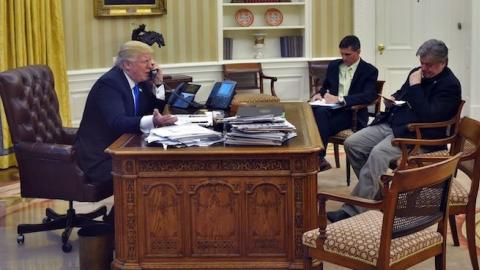Reports of President Donald Trump's fiery phone call with Australian Prime Minister Malcolm Turnbull quickly went viral yesterday. According the Washington Post, Trump berated Turnbull about a refugee resettlement deal negotiated by the Obama Administration before abruptly ending the conversation:
“This is the worst deal ever,” Trump fumed as Turnbull attempted to confirm that the United States would honor its pledge to take in 1,250 refugees from an Australian detention center.
Trump, who one day earlier had signed an executive order temporarily barring the admission of refugees, complained that he was “going to get killed” politically and accused Australia of seeking to export the “next Boston bombers.”
Trump returned to the topic late Wednesday night, writing in a message on Twitter: “Do you believe it? The Obama Administration agreed to take thousands of illegal immigrants from Australia. Why? I will study this dumb deal!”
The readouts of Trump's less-than-diplomatic phone call have provoked understandable concern about Trump's capacity to work productively with America's strongest allies. And the critics have good reason to question Trump's combative approach; if Trump is angry at Obama for taking a deal he doesn't like, he shouldn't take it out on the Australian PM.
Nonetheless, the outrage at Trump's words has obscured the underlying problem here, which is the inevitable impact of the Middle East mess on international politics. This isn’t an argument between noble Australians swooping in to rescue refugees and hard-hearted, evil Americans who don’t want them. It’s about two countries facing a burden that neither quite knows how to manage.
Australia has long been haunted by refugees—some political, some economic—who pay people-smugglers in Indonesia to put them on boats headed for Australia. While Australia as a society is open to immigrants in a way most countries around the world are not, it is, for completely understandable reasons, unwilling to be a doormat where anybody willing to bribe a people-smuggler can establish permanent residence at will.
So what to do with the people? Over the years Australians have struggled to come up with answers. Not surprisingly, there aren’t any good ones and the politics of refugees gets ugly fast. Most people are appalled at the idea of thousands of people penned up in detention centers and refugee camps; most people also blanch at the idea of opening the frontiers.
The debate over Australian immigration detention centers is not a new one; the first such facility was established on Australian territory in 1966. Even as the number of such centers has grown, they have always been controversial, with periodic riots and escapes and persistent human rights criticisms chipping away at support. The so-called Pacific Solution, first implemented in the early 2000s, established Pacific detention centers off Australia's shores in Papua New Guinea and the island of Nauru, but support for that, too, has waxed and waned; offshore processing was abandoned in 2007 before resuming again in 2012 after an uptick in asylum seekers. Australia's current asylum policy has established a "zero tolerance" stance toward illegal boat arrivals, combined with mandatory detention. This has helped keep asylum seekers out of Australia, but it has also left Turnbull with an intractable humanitarian problem.
The deal between Trumbull and Obama was a swap: Australia would take some of the Central American refugees that were embarrassing the United States in an election year and threatening Obama’s political interests, in exchange for a small number of Middle Eastern refugees from Australia. Central Americans aren’t a big issue in Australia, so Turnbull looked good at home; Obama (and presumably Clinton) felt that the deal would largely escape notice in the United States.
But the politics of refugees can’t be wished away. Obama’s problem was that many of his supporters would have been furious at the United States turning away Central American refugees, so for him the deal made political sense. But for Trump, the calculus is different. His base won’t be unhappy with him if he doesn’t accept Central American refugees, so he gains nothing from the deal.
The diplomatic problem is how Trump and Turnbull can find a mutually acceptable way out of the impasse. Perhaps a home for the Middle Eastern refugees in the Pacific can be found elsewhere, with the United States and Australia working together to manage the finances. There are certainly some rich, American-allied countries in the Gulf who could do a lot more in this field.
Australia is a valuable and important American ally, and President Trump and his team need to keep that in mind as they look for ways to resolve this problem. Managing diplomatic problems like this and finding acceptable compromises is what Secretaries of State are for; now that Secretary Tillerson has been confirmed we can hope that he will bring the State Department's brainpower to bear on figuring out a way forward.
But those who fantasize that opening the doors to refugees on a massive scale is sustainable policy in either Australia or the United States need to go back and study history. More people want to live in countries like the United States and Australia than either country can admit. It’s not immoral to acknowledge that reality and it’s not wrong for voters in both countries to expect their political leadership to secure the borders.
That doesn’t excuse us all as human beings from concern for refugees, and there is a clear moral duty to help displaced and suffering people. But that duty, like all others, has to be addressed in a holistic and sustainable way. Australia and the United States can and should work together on the problems of refugees, the troubles in the Middle East, and the need for the burden of refugees to be more widely shared.

















